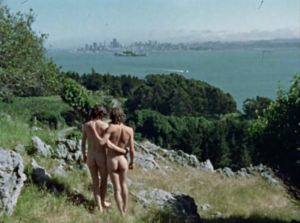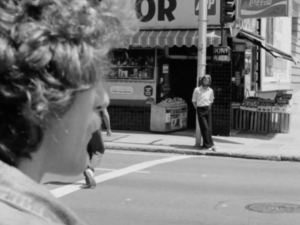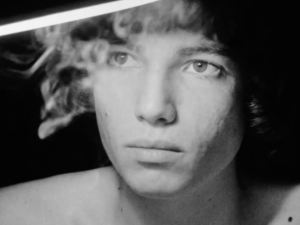Imagine, if you will, a time before carefully categorized and context-free snippets and vignettes on PornHub—a time before 10,000 slangy, jokey descriptors turned sex into a comedy routine-meets-consumer transaction. Imagine a time when bushes were hairy—a time before the word twink. Imagine a time when gay pornography often intrinsically aspired to be not just an overtly political act of liberation but a dramatic work of art.
Any work of art that survives the years deserves a good frame. Filmmaker Arthur Bressan Jr., who died of AIDS at age 44 in in 1987, understood this. At the very beginning of his 1974 debut porn feature Passing Strangers, a typical close-up of hardcore cock-and-ass locomotion is revealed to be a screen in a porn theatre, and the film’s view soon expands further, back to the projection room. There, looking at a sex ad in the Berkeley Barb as he talks on the phone with a friend, the projectionist (played by Bressan himself) derides the typical porn fare—“washed-out color, shitty prints, lousy soundtrack”—he’s paid to screen.
Washed-out color, shitty prints and lousy soundtrack definitely don’t apply as descriptives to Bressan’s trailblazing Passing Strangers and Forbidden Letters (1979), especially now that they’ve received pristine restorations from The Bressan Project. Disobeying the porn formulas back then and now, Bressan’s early X-rated work is full-bodied, allowing for deep complexities of psychology and knotty problems of the heart, placing his solitary characters within a city—San Francisco—where the scenery ranges from Polk Street cruising to epic pastoral pastimes at Land’s End.

Land’s End is a significant location for Bressan. Both Passing Strangers and Forbidden Letters have passages set there, and it even rates a mention in his New York-set two-hander Buddies (1985), the first dramatic feature-length film about the AIDS epidemic, and a good one at that. (Unlike so many AIDS films that followed, Buddies doesn’t neuter its dying protagonist—instead the film likely influenced an emotionally-charged sex scene in the lauded 2017 ACT UP drama BPM.) Bressan’s first two porn movies chart a land’s end of internal and external experience, played out in the orgasmic merging of bodies and in intense solitude marked by lengthy voice-over.
Inner psychology, rarely a porn concern, is to the fore in both Passing Strangers and Forbidden Letters. One sequence in each illustrates the differences between early Bressan porn and a more typical X-rated effort from any era. In Passing Strangers, 18-year-old Robert (played by the director’s waif-like well-hung muse, Robert Adams) sashays into an adult bookshop eating an apple and chuckling at the wares on the racks. He’s slightly more rapt viewing a four-way on a screen in the shop’s arcade, but he doesn’t strip naked and jerk off his smooth, girth-y cock until he’s at home—watching D.W. Griffith’s Broken Blossoms on TV.

A sequence in Forbidden Letters, also centered around Adams, completely inverts one of vintage gay porn’s favorite motifs, the voyeur who joins the action. Here, as youthful introvert Larry, he enters a porn theatre, where an onscreen trio explore pleasure on the beach. Through clever jump cuts, Larry passes into the world of the movie, forlornly watching the sandy action while hugging his knees, sitting closer and closer to the naked men, yet in ever starker isolation. When the fourth wall breaks, orgasms aren’t in the offing. The scene simply ends.
Even when viewed outside the realm of pornography, both Passing Strangers and Forbidden Letters are formally audacious. At the exact halfway mark of Passing Strangers, when the chief characters finally pass through the mystery of personal ads and intimacy of letters to meet in the flesh, the film switches from black-and-white to vivid color. Forbidden Letters’ opening minutes are dominated by breathless pans past the bars of a prison cell and one outlandishly artful exterior shot that places an office desk in the foreground and the Golden Gate Bridge in the background. Four cum shots are uncorked before the credits arrive.
The negative space in Bressan’s film’s is deep, imaginative, and unconventional. Not only does he shoot footage to include within the dramatic mise-en-scène of a particular movie, he also frequently weaves footage from his other works into a film. His layered movies coexist within the same world. Documentary is the ground his fictive characters tread upon. (The one self-contained exception might be his proto-New Queer Cinema 1983 debut dramatic feature Abuse, an almost heedlessly bold take on child abuse, with a symbolically loaded seconds-long cameo by David Wojnarowicz, that deserves an essay of its own.)
In lesser hands, recycling one’s own material reeks of cynical thrift, but Bressan’s interweaving of his works is pointed. No other porn contemporary, even Wakefield Poole, matches his commitment to gay liberation. In the latter half of Passing Strangers, lovers Tom and Robert march together on Gay Freedom Day, the footage coming from Bressan’s 1972 short Coming Out. Forbidden Letters draws from Bressan’s ambitious 1977 coast-to-coast depiction of Gay Freedom Day marches, Gay USA. Late in Buddies, a hospital room VHS viewing of one of Bressan’s earlier movies facilitates a dueling discussion about gay lib between the two protagonists, before one helps the other jerk off.

Intergenerational lust is at the center of most Bressan features; his filmography includes the hilariously titled Daddy Dearest. The director’s first male ingenue Adams plays the younger half of couples in both Passing Strangers and Forbidden Letters. A decade separates 18-year-old Robert from Tom (Richard Carnagey) in Passing Strangers, while in the latter Adams’ nervously brooding Larry awaits the release from prison of enigmatically troubled Richard (built and hirsute Richard Locke, whose onscreen work ranges from iconic roles in Joe Gage’s mega-masculine porn to a brief appearance on Laverne & Shirley).
But is the sex hot, you ask? Well … It’s important to remember that we’re in a different era, one where crude pump and dump is a dominant sex style of the day. Bressan’s first porn films date from a time when “making love” was a popular term in the vernacular, and indeed, there is a fair amount of tender lovemaking on display, even when macho icon Locke is onscreen. Set to original soundtracks that range from bluesy tunes to modular synth doodling, the sun-dappled idyllic couplings in Passing Strangers and Forbidden Letters are chock full o’ cock worship, but they don’t adhere to “older butch top schools femme bottom” expectations.
Recognize: these movies date from a time before video, when porn was still exploratory. And realize: Arthur Bressan Jr. is a filmmaker whose varied approaches to style and subject matter are matched by a resolute devotion to confessional and confrontational candor. This honest pioneer’s brief but expansive career spans from porn to documentary to R-rated drama in just over a decade. There is no doubt that Bressan deserves a larger and more established space within appreciations of queer cinema history.
Passing Strangers is now available for viewing and Forbidden Letters premieres on August 22 at Pink Label TV.






